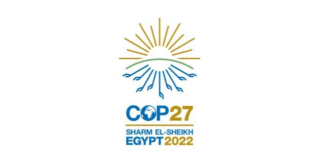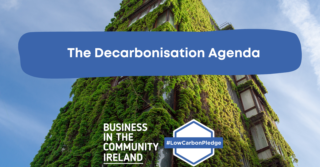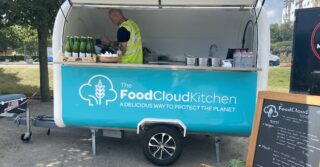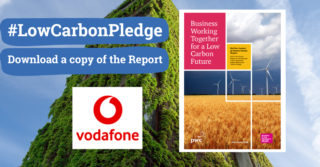Press Release: New research uncovers barriers for Irish business on decarbonisation journey
-
Data access, complex value chains, guidance and leadership buy-in cited as challenges
-
Customer relationships, reputation and stakeholder engagement still seen as primary benefits
Tuesday 13th October: New research on the readiness of businesses in Ireland to fully reduce their carbon emissions shows that including Scope 3 emissions in a company’s footprint assessment is proving a difficult task,
Business in the Community Ireland (BITCI), the country’s leading advisors on sustainability, launches new research “Progressing towards science-based targets” which examines the readiness of businesses in Ireland to fully reduce their carbon emissions.
BITCI launched its Low Carbon pledge in 2018, the first of its kind in Ireland, with the aim of gathering Irish businesses to make a collective statement and commitment around carbon reductions and critically have companies share learnings across sectors.
As the race to decarbonise intensifies, BITCI commissioned Quantis, a sustainability consulting firm, to examine how ready the Low Carbon Pledge signatories were to commit to targets based on science i.e. targets necessary to meet the goals of the Paris Climate Change Agreement.
The achievement of these science-based targets requires the inclusion of indirect (or Scope 3) value chain emissions. The research shows 71% of the companies surveyed are already reporting and assessing all or parts of their value chain emissions, but are finding it difficult due to complex value chains and supply networks. Among its highlights, the research shows:
- Business travel (90%) and waste (70%) are the categories most widely reported by companies addressing their scope 3, probably due to ease of access to data and relatively easy calculation of the resulting carbon emissions.
- ‘Fuel and energy-related activities’ was the third most commonly reported category, addressed by more than 56% of reporting companies. Downstream transportation, and purchased goods and services were also well represented (+25%).
- At the time of the survey, amongst the 30 respondents already addressing parts of or all their scope 3 emissions, 26 companies have already set or are in the process of setting carbon reduction targets to decrease their total carbon footprint. However, these targets do not necessarily include scope 3 reduction objectives for all companies. Most targets include scope 1 and 2 only.
- Of the 26 companies which have already set internal reduction targets, 14 have already submitted or set Science Based Targets initiative’s (SBTi) aligned targets.
- 98% declared a sense of corporate responsibility as the primary driver to assess Scope 3 emissions with 75% citing reputational risks over operational efficiency (54%). Only a third of respondents (36%) cited regulatory change as a driver
- Customer relationships, reputation, and engagement with stakeholders were identified as the primary benefits with an emphasis on engaging and communicating progress to clients and stakeholders.
- About two thirds (64%) of companies assessing their scope 3 emissions are communicating actively with internal and external stakeholders on this topic. The most developed means of communications are CDP (Carbon Disclosure Project) reporting and the use of internal/external sustainability reports.
Minister for Climate Action, Communication Networks and Transport, Eamon Ryan TD commented
“I welcome this innovative research which acts as a roadmap to absolute emission reduction in various sectors of our economy and provides guidance for companies to engage in science-based target setting. This is a much-needed resource for the business community in its journey to net-zero emissions.”
Tomás Sercovich, CEO Business in the Community Ireland noted that the level of engagement is encouraging and can be expected to increase as internal and external pressure to account for indirect emissions grows and when clear guidance and the assessment methodology are available. He added:
“Our Low Carbon Pledge has greatly helped put companies on the right path, but the level of ambition must be increased during the recession. To ensure Ireland’s climate transition, there must be an increase in the rate of adoption of science-based targets by business. Leadership and a strategic understanding of this issue is urgently needed as corporate Ireland must make this investment over the coming two to three years to be fit for purpose in a low carbon economy”.
Although these results show a general trend regarding scope 3 assessments, they need to be treated carefully, as material scope 3 categories vary widely between sectors. For example, purchased goods and services might cover 90% plus of total indirect emission for an agri-food business but almost be absent in a professional services environment.
This research was commissioned by Business in the Community Ireland and co-funded by We Mean Business, a global non-profit coalition working with the world’s most influential businesses to take action on climate change.
Download a copy of the research.
Editors notes
According to the Environmental Protection Agency, GHG emissions reduction will fall short of the 2020 target (20% reduction) with a decrease of only 6% compared to 2005 levels. While the energy sector has shown encouraging reductions due to the development of new renewable energy capacity and a reduction in fossil fuels, emissions related to transport, households and agriculture have all shown an increase. Ireland is still behind its national and international commitments.
Out of the 58 signatories, 42 companies responded to the questionnaire plus 10 in-depth interviews. The 42 companies who participated in the research are: A&L Goodbody, ABP Ireland, AIB Group, An Post, Arup, Aviva, Bank of Ireland Group, Boston Scientific, BT, Britvic, Central Bank, Dawn Meats Group, Deloitte, Dublin Bus, EirGrid plc, Enterprise Rent-a-Car, ESB Group, Gas Networks Ireland, Heat Merchants Group, HEINEKEN Ireland, Irish Water, J&J – Du Puy, J&J – Vision Care, Janssen Pharmaceutical Sciences UC, KBC Bank Ireland, KPMG, Lidl Ireland, Marks & Spencer (Ireland) Ltd, Matheson, Mercury Engineering, Musgrave Group, Northern Trust Ireland, PM Group, PwC, RTÉ, Sherry Fitzgerald, Sky Ireland, SSE Ireland, Tesco Ireland, Ulster Bank Ireland DAC, Veolia, Verizon, Vodafone Ireland, William Fry.
ABOUT QUANTIS
Quantis guides top organizations to define, shape and implement intelligent environmental sustainability solutions. In a nutshell, our creative geeks take the latest science and make it actionable. We deliver resilient strategies, robust metrics, useful tools, and credible communications.
With offices in the US, France, Switzerland, Germany, and Italy, and clients around the world, Quantis is a key partner in inspiring sustainable change on a global scale.
Visit Quantis on https://quantis-intl.com/
For further information, please contact Moira Horgan, Head of Marketing on 086 172 2105 or mhorgan@bitc.ie
Tags:






